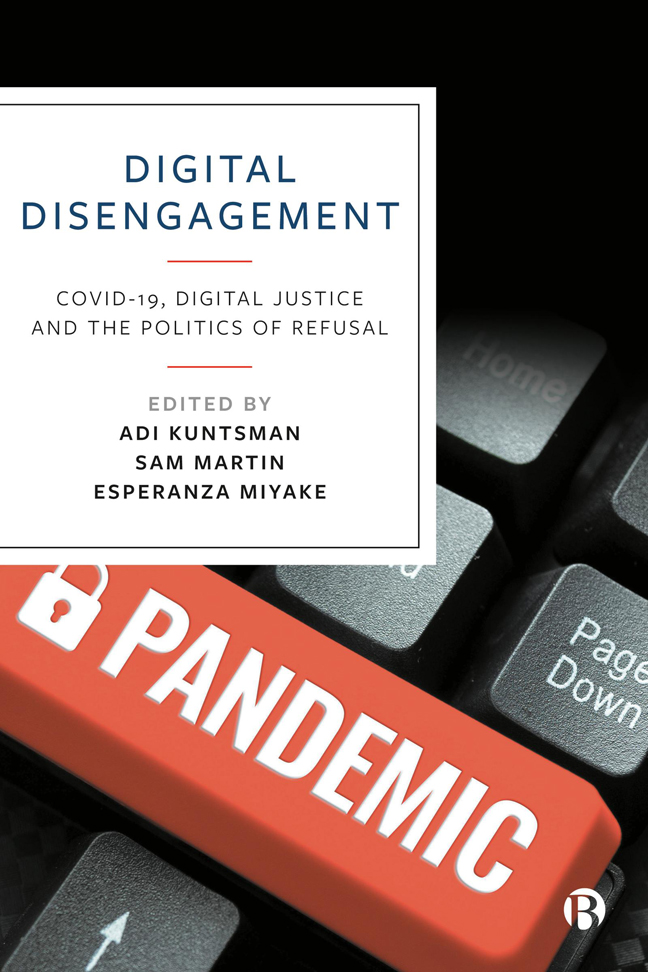Book contents
- Frontmatter
- Contents
- Notes on Contributors
- Introduction
- One En/forcing the Tokyo 2020 Olympics: The Racialization of Digital Engagement and Digital Solutionism
- Two Digital Engagements and Work–Life Balance in Creative Labour
- Three ‘#RoeVsWadeOverturned: Any Idea How Fast Your #PeriodtrackingApp Can Lead To Jail?’: Digital Disengagement and the Repeal of Roe vs Wade
- Four #SnailMailRevolution: The Networked Aesthetics of Pandemic Letter-Writing Campaigns
- Five Data Minimalism and Digital Disengagement in COVID-19 Hacktivism
- Six Digital Solutionism Meets Pandemic Imaginaries
- Seven State Violence, Digital Harms and the COVID-19 Pandemic: Imagining Refusal, Resistance and Community Self-Defence
- Epilogue: Digital Disengagement – Questions of Pandemic and Post-Pandemic Digitalities
- Index
Three - ‘#RoeVsWadeOverturned: Any Idea How Fast Your #PeriodtrackingApp Can Lead To Jail?’: Digital Disengagement and the Repeal of Roe vs Wade
Published online by Cambridge University Press: 25 January 2024
- Frontmatter
- Contents
- Notes on Contributors
- Introduction
- One En/forcing the Tokyo 2020 Olympics: The Racialization of Digital Engagement and Digital Solutionism
- Two Digital Engagements and Work–Life Balance in Creative Labour
- Three ‘#RoeVsWadeOverturned: Any Idea How Fast Your #PeriodtrackingApp Can Lead To Jail?’: Digital Disengagement and the Repeal of Roe vs Wade
- Four #SnailMailRevolution: The Networked Aesthetics of Pandemic Letter-Writing Campaigns
- Five Data Minimalism and Digital Disengagement in COVID-19 Hacktivism
- Six Digital Solutionism Meets Pandemic Imaginaries
- Seven State Violence, Digital Harms and the COVID-19 Pandemic: Imagining Refusal, Resistance and Community Self-Defence
- Epilogue: Digital Disengagement – Questions of Pandemic and Post-Pandemic Digitalities
- Index
Summary
Introduction
Over the last decade, there has been a large increase in people's use of mobile health apps (mHealth) to track not only their general health, fitness levels and mental health (Ming et al, 2020), but also more specific medical conditions and biological indicators, such as chronic illnesses, obesity, and fertility and menstruation cycles (Byambasuren et al, 2018; Polzer et al, 2022). While the use of mHealth apps was indeed prevalent before the pandemic, during the pandemic itself, the increased reliance on technology for virtual communication, data collecting and data sharing during lockdowns, quarantines and beyond has meant that people have focused more on using technology and mHealth apps than ever before. In this chapter, ‘pre-pandemic’ refers to the 10-year period between 2010 and the start of the COVID-19 pandemic in February 2020, ‘during the pandemic’ refers to the period from February 2020 until the first COVID-19 vaccine rollouts in December 2021 to March 2022, and ‘post-pandemic’ refers to the period between the time when the COVID-19 vaccine programme became more globally established and worldwide lockdowns decreased (from April 2022 to September 2022 and beyond). The chapter discusses the continuation of use of period apps during the pandemic (from February 2020 to March 2022), and the worry expressed by women regarding use of the apps that they had used before and during the pandemic during the window of time after Roe vs Wade was repealed in June 2022, with a continued discussion of app surveillance and a desire to digitally disengage from or circumvent this surveillance in the months going forward.
During the pandemic, one of the main focuses of mHealth apps was to develop an understanding of how to navigate the coronavirus during the pandemic and understand how it affected our bodies (Shah et al, 2021), not only in terms of initial infection and recovery (or prolonged symptoms/non-recovery in the context of long COVID), but also in terms of the effect of this new virus on everyday bodily functions, such sleep, mental health and mobility (Robertson et al, 2021).
- Type
- Chapter
- Information
- Digital DisengagementCOVID-19, Digital Justice and the Politics of Refusal, pp. 61 - 82Publisher: Bristol University PressPrint publication year: 2023



